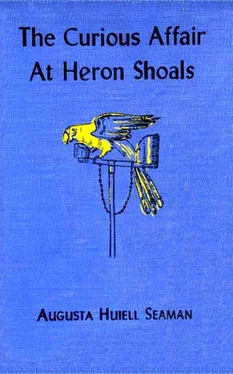Augusta Huiell Seaman - The Curious Affair at Heron Shoals
Здесь есть возможность читать онлайн «Augusta Huiell Seaman - The Curious Affair at Heron Shoals» — ознакомительный отрывок электронной книги совершенно бесплатно, а после прочтения отрывка купить полную версию. В некоторых случаях можно слушать аудио, скачать через торрент в формате fb2 и присутствует краткое содержание. Жанр: unrecognised, на английском языке. Описание произведения, (предисловие) а так же отзывы посетителей доступны на портале библиотеки ЛибКат.
- Название:The Curious Affair at Heron Shoals
- Автор:
- Жанр:
- Год:неизвестен
- ISBN:нет данных
- Рейтинг книги:4 / 5. Голосов: 1
-
Избранное:Добавить в избранное
- Отзывы:
-
Ваша оценка:
- 80
- 1
- 2
- 3
- 4
- 5
The Curious Affair at Heron Shoals: краткое содержание, описание и аннотация
Предлагаем к чтению аннотацию, описание, краткое содержание или предисловие (зависит от того, что написал сам автор книги «The Curious Affair at Heron Shoals»). Если вы не нашли необходимую информацию о книге — напишите в комментариях, мы постараемся отыскать её.
The Curious Affair at Heron Shoals — читать онлайн ознакомительный отрывок
Ниже представлен текст книги, разбитый по страницам. Система сохранения места последней прочитанной страницы, позволяет с удобством читать онлайн бесплатно книгу «The Curious Affair at Heron Shoals», без необходимости каждый раз заново искать на чём Вы остановились. Поставьте закладку, и сможете в любой момент перейти на страницу, на которой закончили чтение.
Интервал:
Закладка:
“Oh, tell me what you know—please Marty! I do so love a mystery!” This was an even more enthusiastic response than she had expected. Now was the time to plunge into it.
“Well,” she said, “I hardly know anything at all about the thing, but I’ll tell you what I do know—and some of the things I suspect. Thusy’s always been here, as long as I can remember—and long before I was here myself. You see, my father and mother are both dead. I lost them when I was a baby. Father was Nana’s oldest son. After he died, my mother didn’t live very long, and then Nana took me to live with her. Thusy was here when I came, so I’ve sort of grown up with him. Mostly I never think much about him but sometimes, when he says something odd, he makes me wonder about him. I remember asking Nana, when I was quite young, where she got him. All she’d say was that some one who stayed here long ago had him and gave him to her and she’s kept him ever since. And when I asked who it was, she said I asked too many questions and not to bother her about it. And that’s all I ever did get out of her. I don’t know why she doesn’t want to talk about it, but she acts like that about a lot of things. It’s her way, I guess!” Ted had been listening to all this with breathless interest.
“But doesn’t any one else know?” he demanded. “How about Captain Cy? He’s one of her sons, too, isn’t he? He was telling Dad this morning quite a lot about this place. Said he’d been Skipper at this Station for fifteen years before he retired this last year. Surely he ought to know!”
“I asked him once about it, too,” said Marty, “but he said Nana’d had Thusy so long he couldn’t remember about when she did get him—thought some sailor or coast-guard or some one like that had left him with her. You see, he left home when he was quite a young boy and went to sea for a long while. When he left the sea, he came back and became a coast-guard himself and was sent to a station way down the coast, so he didn’t know much about what went on home here. I guess he doesn’t know any more about Thusy than the rest of us do.” Ted mulled over this in silence for a few minutes. Then he asked,
“But you said Thusy says some queer things once in a while. What are they? I haven’t heard him say that kind of thing yet.”
“Well,” replied Marty thoughtfully, “once in a while, without any reason, he suddenly says, ‘I’ll never tell!’ Keeps repeating it over and over. And just once, when Nana wasn’t around and I was alone with him in the kitchen, he woke up from a nap and began to shriek—‘Hide it, Jack!—Hide it!—I’ll never tell!’ That was queer, wasn’t it? I never dared ask Nana about it.”
“My, but that was strange!” commented Ted. “I wonder who Jack was—and what was going to be hidden?”
“If we knew that,” said Marty sagely, “we’d know a lot more than we do about the mystery. Maybe ‘Jack’ was the person who owned him first.”
“Do you always keep Thusy chained to his perch?” demanded Ted, veering to another angle of the subject. “Don’t you ever let him fly around loose?”
“Nana used to let him fly around the kitchen when she cleaned his perch,” said Marty. “She’d close all the windows and doors while he was free, and he liked it a lot. But she won’t do it any more. She makes him get into an old parrot-cage she has while she cleans up, now.”
“Why’s that?” questioned Ted.
“Well, about three years ago, a queer thing happened one day,” Marty went on. “I was away at school and Nana locked up the house—shut everything tight, and walked up to town to do some marketing. When she got back, Thusy was gone! He wasn’t on his perch and part of the chain was lying on the bottom of it. She saw at once what had happened. The chain was very old and rusty, and Thusy had somehow managed to gnaw through one of the links and get away. She thought, of course, she’d find him around the house somewhere. She was sure he couldn’t have got out because every door and window was shut. But, though she searched in every nook and corner, and called and called him—there wasn’t a sign of him to be found. She thought she’d lost him for good, and felt so bad about it that I found her crying when I got back from school.
“I said he simply must be in the house and let’s hunt for him again. So we went over the house from top to bottom. We even hunted way up in that look-out tower on the roof, and then we went down to the cellar. But no Thusy! But you’ll never guess what we found when we got back to the kitchen at last—there was Thusy sitting on his perch, with a piece of chain dangling from his leg, just as if he’d never been away! And when he saw us he began to chuckle, just as if he was laughing at us! And we’ve never discovered to this day where he could have hid himself!”
“Well, that was the queerest thing!” commented Ted. “He couldn’t have been out of the house at all.”
“He must have been!” cried Marty. “There wasn’t a corner we didn’t search—under the beds and other furniture—everywhere! There just wasn’t any place he could have hidden. And yet, if he got out of the house, I can’t imagine how he did it, for there wasn’t a window or door open so much as a crack.” They pondered in silence for a few moments over the mystery. Presently Ted changed the subject again.
“It’s strange about that old house you live in,” he commented, glancing back at the upper floors and cupola that were visible from where they sat, rising above the clustering cedars well back of the Station. “It’s such a big house—almost the only one on this long stretch of beach, except Captain Cy’s opposite the Station. How did it come to be here?”
“Why, Grandfather Greene—Nana’s husband—built it when he was in the Coast-Guard Station here. They used to live over across the Bay, as most coast-guardsmen do, but he didn’t like the long trip to get back home, so he built this house for them to live in the rest of their lives. He died a long time ago, but Nana has always kept on living here. She likes it and won’t ever live anywhere else. I’d much rather live across the Bay in town where you could have a nice house and electricity and all that sort of thing, and I’d be near school. But she wouldn’t move—and we couldn’t afford it anyway—so here we stay!”
“I think it’s a lovely place,” said Ted. “I’d like to live here all the time. It’s so quiet and peaceful—and right by the ocean. Somehow even the music sounds different here from what it does anywhere else!”
As if to verify his last remark, there was wafted through the open windows of the Station the sound of some resonant chords and then the opening bars of a Chopin Polonaise. Evidently the Professor had wearied of the task of untangling his fishing-line and was consoling himself with music. The two on the dunes sat silent, listening to the rich chords and rippling runs. They seemed to fit in with the mood of the perfect day, carrying the spirit to heights of ecstasy.
“He plays beautifully!” said Marty softly, when the echo of the last chords had died away. She herself loved music, though she had no talents to produce any.
“Yes, he’s a master,” acknowledged Ted, and ended wistfully, “I hope some day I’ll be able to play like that!”
“I haven’t heard you play yet,” remarked Marty, “and you’ve been here nearly three days.”
“I’m just having a little holiday,” said the boy. “Dad didn’t want me to begin real practice till Monday, so that I could get a little used to the place first. I did try the pianos out with Monsieur on Friday but—”
He got no further, for Marty, who had been looking down the beach as they were talking, suddenly gripped his arm and exclaimed:
Читать дальшеИнтервал:
Закладка:
Похожие книги на «The Curious Affair at Heron Shoals»
Представляем Вашему вниманию похожие книги на «The Curious Affair at Heron Shoals» списком для выбора. Мы отобрали схожую по названию и смыслу литературу в надежде предоставить читателям больше вариантов отыскать новые, интересные, ещё непрочитанные произведения.
Обсуждение, отзывы о книге «The Curious Affair at Heron Shoals» и просто собственные мнения читателей. Оставьте ваши комментарии, напишите, что Вы думаете о произведении, его смысле или главных героях. Укажите что конкретно понравилось, а что нет, и почему Вы так считаете.












